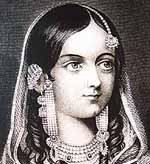
It so happened that Bahadur Shah Zafar's favorite wife, Begum Zeenat Begum asked Ghalib to write a 'sehra' (a tribute, if you will,) for her son, Shehzada Mirza Jawan BaKhth's wedding. Complying with the Begum's wish, Ghalib wrote a 'sehra' whose maqt'a said:
'hum suKhan_fehm haiN, Ghalib ke tarafdaar nahiN
dekheN keh de koi is sehre se baRh kar sehra'
(I'm someone who appreciates poetry, am not partial to Ghalib
Let's see if there's anyone who can write a better 'sehra')
It's believed that the Emperor wasn't pleased with the maqt'a. He was told that it was a dig at ShaiKh Ibrahim Zauq, Zafar's ustaad. Taunting the 'ustaad' was tantamount to slighting the Emperor and his taste, and all the rest of it. Zafar asked Zauq to write a 'sehra' as well and Zauq's 'sehra' had a maqt'a which was something of retort to Ghalib's maqt'a:
jin ko daawa ho suKhan ka yeh sunaa do unko
dekh is taraH se kehte haiN suKhanwar sehra
(Tell those who claim to be poets
This is how poets write a maqta'a)
Ghalib wrote his celebrated apology, 'qat'a-e-ma'azerat' in response to the Emperor's reaction, clarifying his position. The most interesting part is that the great master laced every single 'shayr' with veiled irony in his inimitable style and didn't leave a single opportunity to take a dig at 'Zauq':
manzoor hai guzaarish-e-ahvaal-e-waaqa'aii
apna bayaan-e-Husn-e-tabii'yat nahiN mujhe
sau pusht se, hai pesha-e-aaba sipahgari
kuchh shayari, zari'ye-e-izzat nahiN mujhe
aazaadah rau huN, aur mira maslak hai sulH-e-kul
hargiz kabhi kisi se adaawat nahiN mujhe
kya kam hai yeh sharaf ke Zafar ka Ghulaam huN
maana ke jaah-o-mansab-o-sarwat nahiN mujhe
ustaad-e-shah se ho mujhe parKhaash ka Khayaal
yeh taab, yeh majaal, yeh taaqat nahiN mujhe
jaam-e-jahaaN_numa hai shahenshaah ka zameer
saugand aur gawaah ki Haajat nahiN mujhe
maiN kaun, aur reKhta, haaN is se mudda'a
juz inbisaat-e-Khaatir-e-Hazrat nahiN mujhe
sehraa likhaa gaya ze_rah-e-imtiSaal-e-amr
dekhaa ke chaarah Ghair ita'at nahiN mujhe
maqt'e meiN aa paRi hai suKhan gustaraana baat
maqsood is se qat'a-e-moHabbat nahiN mujhe
ruu-e-suKhan kisi taraf ho, tau ruu_siyaah
sauda nahiN, junooN nahiN, veHshat nahiN mujhe
qismat buri sahii, pa tabii'yat buri nahiN
hai shukr ki jagah, ke shikaayat nahiN mujhe
saadiq huN apne qaul meiN Ghalib Khuda_gawaah
kehta huN sach ke jhooT ki a'adat nahiN mujhe

